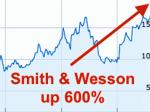AFP
Smith & Wesson's investors are celebrating today.
Shares of the gunmaker are up over 10% following the release of the company's better-than-expected quarterly earnings report.
"Our first quarter results exceeded our expectations for sales and net income in both our firearms and accessories divisions, CEO James Debney said. "Higher revenue in our firearms division was driven by strong orders for our M&P 15 Sport rifles, our Thompson/Center Venture bolt-action rifles and our M&P Shield polymer pistols."
All of this comes as the outrage over lax U.S. gun control seems to be intensifying.
S&W says business boomed after Obama became presidentThe irony of the gun control debate is that when it seems tighter gun control policy is coming, sales spike.
"[W]e experienced strong consumer demand for our firearm products following a new administration taking office in Washington, D.C. in 2009," said the management of gunmaker Smith & Wesson.
That's when President Barack Obama moved into the White House.
The explanation for this phenomenon is pretty simple: If there's a risk that you won't be able to buy guns in the near future, then buy your guns now.
Sadly, the biggest pushes for more gun control come after high-profile shootings, like the 2012 killing of 20 children at Connecticut's Sandy Hook Elementary School. And it's following those incidents that gun makers report strong sales.
In a recent presentations to investors, Smith & Wesson management celebrate the seemingly ever growing demand for firearms. One proxy for demand is the volume of background checks that get submitted to the FBI's National Instant Criminal Background Check System, or NICS. As you can see in the chart above, NICS is going up.
To be clear, gunmakers don't benefit from tighter gun control. They benefit when there are talks of tighter gun control but those talks go nowhere.
Should tighter gun control actually get signed into law, then you would have a different story. Smith & Wesson explains: "Federal and state legislatures frequently consider legislation relating to the regulation of firearms. These proposed bills are often varied, but may seek to restrict the makeup of a firearm, including limitations on magazine capacity; mandate the use of certain technologies in a firearm; or ban the sale and, in some cases, the ownership of various types of firearms.
"If such restrictive legislation is enacted, we could find it difficult, expensive, or even impossible to comply with them, impeding new product development and distribution of existing products."
For now, restrictions haven't prevented sales from growing.
See Also:
